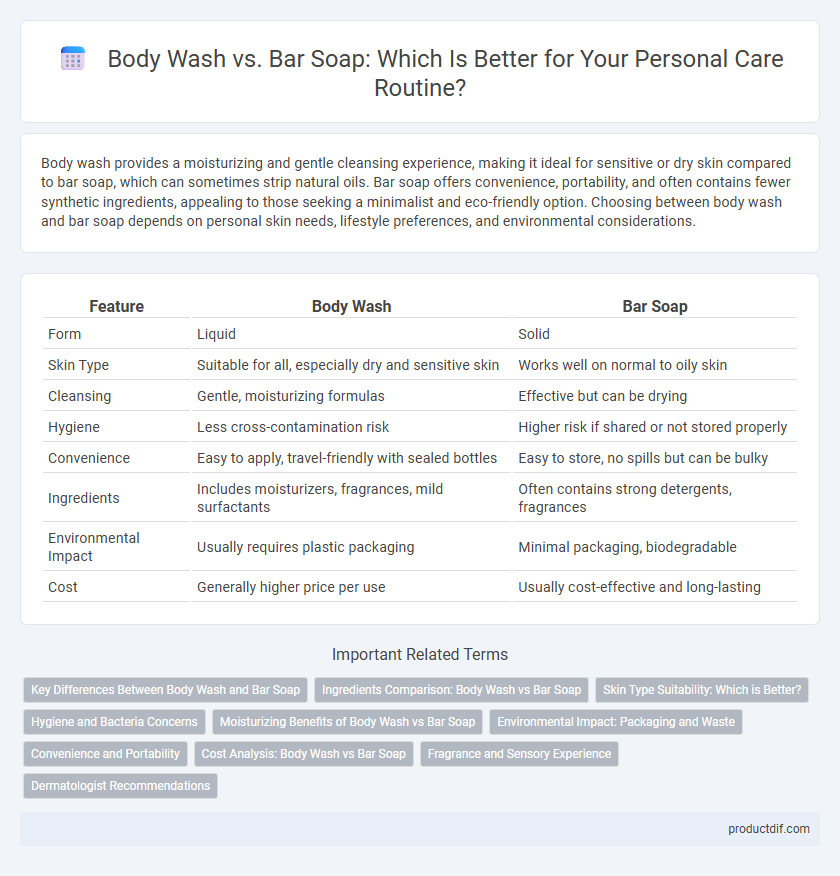Body wash provides a moisturizing and gentle cleansing experience, making it ideal for sensitive or dry skin compared to bar soap, which can sometimes strip natural oils. Bar soap offers convenience, portability, and often contains fewer synthetic ingredients, appealing to those seeking a minimalist and eco-friendly option. Choosing between body wash and bar soap depends on personal skin needs, lifestyle preferences, and environmental considerations.
Table of Comparison
| Feature | Body Wash | Bar Soap |
|---|---|---|
| Form | Liquid | Solid |
| Skin Type | Suitable for all, especially dry and sensitive skin | Works well on normal to oily skin |
| Cleansing | Gentle, moisturizing formulas | Effective but can be drying |
| Hygiene | Less cross-contamination risk | Higher risk if shared or not stored properly |
| Convenience | Easy to apply, travel-friendly with sealed bottles | Easy to store, no spills but can be bulky |
| Ingredients | Includes moisturizers, fragrances, mild surfactants | Often contains strong detergents, fragrances |
| Environmental Impact | Usually requires plastic packaging | Minimal packaging, biodegradable |
| Cost | Generally higher price per use | Usually cost-effective and long-lasting |
Key Differences Between Body Wash and Bar Soap
Body wash contains moisturizing agents and offers a gel-like texture that spreads easily, providing gentle cleansing suitable for sensitive skin, while bar soap is solid, often more alkaline, and can sometimes strip natural oils, potentially causing dryness. Body wash usually includes added fragrances and conditioners to enhance skin hydration, whereas bar soap tends to have simpler formulations with fewer additives. Packaging differences also impact sustainability: body wash uses plastic bottles, whereas bar soap often comes with minimal or biodegradable packaging.
Ingredients Comparison: Body Wash vs Bar Soap
Body wash typically contains synthetic detergents, moisturizers, and fragrances formulated to provide a hydrating cleanse, while bar soap is primarily made from natural oils, lye, and fewer synthetic additives. The formulation of body wash often includes glycerin, surfactants, and preservatives that contribute to a smoother texture and enhanced scent profile compared to bar soap. Bar soap's simpler ingredient list may appeal to users seeking minimal chemicals, whereas body wash offers ingredients targeting specific skin concerns like dryness or sensitivity.
Skin Type Suitability: Which is Better?
Body wash formulations often contain hydrating ingredients suitable for dry or sensitive skin, while bar soap can be more alkaline and potentially irritating for these types. Individuals with oily or normal skin may find bar soap effective in removing excess oils and impurities without over-drying. Choosing between body wash and bar soap depends largely on skin type, with body wash favored for moisture retention and bar soap preferred for deep cleansing needs.
Hygiene and Bacteria Concerns
Body wash typically contains antibacterial agents and is dispensed in a way that limits contamination, reducing bacterial growth compared to bar soap, which can harbor bacteria on its surface after use. Research indicates that liquid body wash products are less likely to spread germs between users due to their sealed packaging and one-time use application. Maintaining hygiene is more effective with body wash formulas that include moisturizing and antimicrobial ingredients, promoting skin health while minimizing bacterial concerns.
Moisturizing Benefits of Body Wash vs Bar Soap
Body wash formulations often contain added moisturizers such as glycerin, aloe vera, and essential oils, which help hydrate and nourish the skin more effectively than traditional bar soaps. Bar soaps can strip natural oils from the skin due to their alkaline nature, potentially leading to dryness and irritation, whereas many body washes maintain the skin's pH balance and deliver lasting moisture. Consumers seeking enhanced hydration benefits typically prefer body wash products enriched with skin-conditioning ingredients over conventional bar soap options.
Environmental Impact: Packaging and Waste
Body wash typically comes in plastic bottles that contribute to long-term environmental waste, whereas bar soap is often packaged in minimal, biodegradable materials like paper or cardboard. Bar soap generates less plastic pollution and reduces landfill burden due to its solid form and sustainable packaging. Choosing bar soap over body wash can significantly lower your personal care routine's ecological footprint by minimizing packaging waste.
Convenience and Portability
Body wash offers greater convenience with easy-to-use bottles and quick application, ideal for on-the-go lifestyles and gym bags. Bar soap provides excellent portability, compact and lightweight, making it perfect for travel without risk of leakage or spills. Both options cater to different preferences, but body wash typically excels in ease of use while bar soap leads in simple transport.
Cost Analysis: Body Wash vs Bar Soap
Body wash typically costs more per ounce compared to bar soap but offers longer-lasting use due to controlled dispensing and concentrated formulas. Bar soap is generally more affordable upfront and produces less packaging waste, making it a cost-effective and eco-friendly option. Evaluating cost-effectiveness depends on usage habits, with body wash favored for moisturizing benefits while bar soap excels in budget-conscious routines.
Fragrance and Sensory Experience
Body wash offers a wide range of fragrance options, often infused with essential oils and botanicals that create a luxurious and long-lasting sensory experience. Bar soap features concentrated scents that deliver a subtle, nostalgic aroma with a natural, creamy lather, appealing to those who prefer minimalist and eco-friendly products. Both provide distinct olfactory profiles, with body wash enhancing scent intensity and bar soap offering a gentle, classic fragrance.
Dermatologist Recommendations
Dermatologists often recommend body wash over bar soap for its gentle formulation and reduced risk of skin irritation, especially for sensitive or dry skin types. Body washes typically contain moisturizers and are less likely to disrupt the skin's natural barrier compared to the alkaline nature of many bar soaps. Choosing dermatologist-approved products with hydrating ingredients like glycerin or ceramides enhances skin health and maintains optimal moisture balance.
Body Wash vs Bar Soap Infographic

 productdif.com
productdif.com